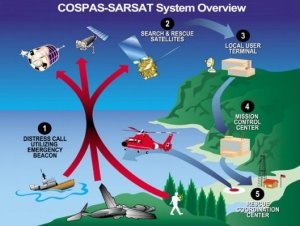Galileo support to Search and Rescue Service (SAR/Galileo) represents the contribution of Europe to the international COSPAS-SARSAT co-operative effort on humanitarian Search and Rescue activities.
Operational use of Cospas-Sarsat by SAR agencies started with the crash of a light aircraft in Canada, in which three people were rescued (September 10, 1982). Since then, the System has been used for thousands of SAR events and has been instrumental in the rescue of over 33,000 lives worldwide.
The System is composed of:
- Distress radiobeacons: ELTs for aviation use, EPIRBs for maritime use, and PLBs for personal use, which transmit signals during distress situations.
- Instruments on board GEO/LEO satellites which detect the signals transmitted by distress radiobeacons.
- Local Users Terminals (LUTs) or ground receiving stations which receive and process the satellite downlink signal to generate distress alerts.
- Mission Control Centers (MCCs) which receive alerts produced by LUTs and forward them to Rescue Coordination Centers (RCCs), Search and Rescue Points Of Contacts (SPOCs) or other MCCs.
The Cospas-Sarsat System included satellites in low-altitude Earth orbit (LEO) which form the LEOSAR System and satellites in geostationary Earth orbit (GEO) which form the GEOSAR System.
With the SAR/Galileo contibution, Cospas-Sarsat system will suffer important improvements such as:
- Near real-time reception of distress messages transmitted from anywhere on Earth (the average waiting time is currently one hour).
- Precise location of alerts (a few meters for EPIRBs and ELTs equipped with Galileo receivers, while the current specification for location accuracy is 5 km)
- Multiple satellite detection to avoid terrain blockage in severe conditions
- Increased availability of the space segment (27 Medium Earth Orbit satellites on top of the four Low Earth Orbit satellites and the three Geostationary satellites in the current system)

